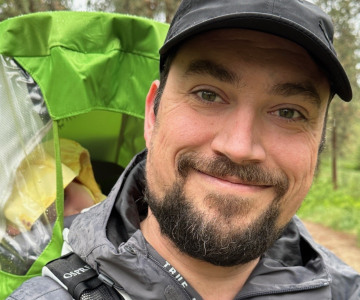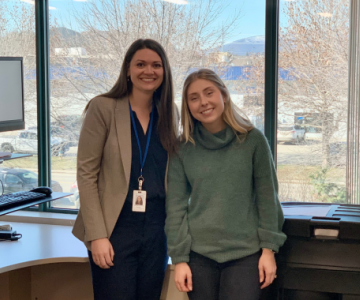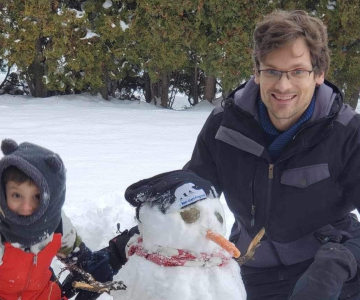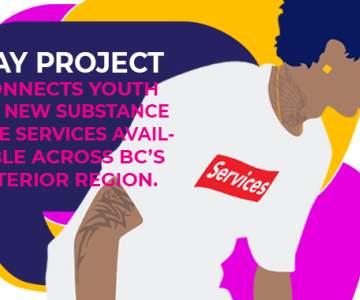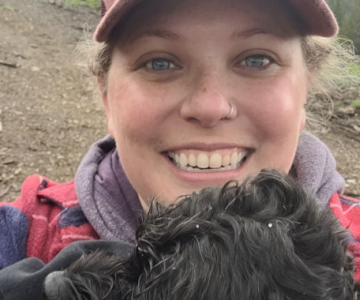Breadcrumb
Explore Stories
Community & Culture
Name: Christopher Russell (he/him/his)Job Title: Leadership & Organization Development ConsultantYears of Service: 2.5Worksite: Community Health & Services CentreCommunity: KelownaAncestral Territory: Syilx/OkanaganFavourite Quote / Advice to live by: “Growth and comfort do not coexist.” – Ginni Rometty, “All things are difficult before they are easy.” – Thomas Fuller
A calm, empathetic and imaginative change management professional, Chris Russell is passionate about working in public service, and supporting the growth and development of others.
From inspiring folks to see new career possibilities through facilitating workshops and development sessions, to being involved in the launch of the Change Leadership and Change Management programs and Interior Health (IH) Change Framework, Chris is a valuable resource as IH navigates change, big and small.
Community & Culture
Interior Health is dedicated to both fostering talent and advancing environmental sustainability— making work-integrated learning a win-win. Learn more from our very own Amanda Mckenzie, manager of environmental sustainability, and Avery Schneider, environmental sustainability intern.
Health & Wellness, Research & Innovation
When you take a drink of water, shower, water your garden or wash your car, have you ever paused to think about the journey your water takes from the source to your taps?
If you’re among tens of thousands of people in the Interior region who rely on the city for your water supply, it’s easy to take for granted we have access to safe, clean drinking water. On the other hand, if you’re on a small water system, you likely have a more intimate knowledge about who provides and treats your water.
You might be surprised to know the Interior is home to close to 2,000 permitted water system providers and operators – a person or organization that supplies and/or treats water. Some water system operators supply water to as few as a half dozen homes or an RV park. Cities like Kelowna and Kamloops provide water to tens of thousands of residents.
Community & Culture
Name: Kris Scott (he/him/his)Job Title: Formulary coordinator, pharmacy servicesYears of Service: 7Worksite: Kelowna CHSC (and home office)Community: West KelownaAncestral Territory: Syilx/OkanaganFavourite Quote / Advice to live by: “Continuous improvement is better than delayed perfection.” -Mark Twain
From the time your health-care provider writes you a prescription in hospital to the time your nurse provides it to you, there’s an intricate process that takes place, one which is always evolving. One of the people helping guide this process is Kris Scott, formulary coordinator for Interior Health pharmacy services.
“I'm passionate about quality improvement,” says Kris, who was born and raised in Prince Rupert, B.C. “Having the opportunity to work as a pharmacist in a unique regional role provides me with almost daily opportunities to contribute to system changes that can improve efficiencies for our IH pharmacy teams in supporting patient care.
"At the end of the day, it's really being able to have a positive impact on patient care that inspires me and the work I do.”
Community & Culture, Health & Wellness
Interior Health has expanded services for youth who use substances to eight cities in B.C.’s interior. To spread the word about this new substance use services we’re working with a team of youth Peers - the SAY Project - who share their lived experience in this blog, online and with video ‘memecasts’! These youth-focussed services include treatment and harm reduction.
Brynn and Hayden are youth in the Interior who have lived experience with substance use. They teamed up with Interior Heath to promote new services for their youth peers.
The SAY project was launched in 2023 to promote the new substance use services Interior Health created specifically for youth across the region. Hayden and Brynn (not their real names) helped create the campaign to spread the word about these services.*
Health & Wellness
Guest post by Elena Kwan, a UBC Dietetics student
As a dietetics student at UBC, I love grocery shopping. However, I’ve noticed that I’ve been more selective about which foods to place in my basket due to a rise in my grocery bills. Like many other Canadians, I’ve found it challenging to keep up with inflation and I’ve had to be creative to keep my grocery bills within my budget.
According to the 2024 Canada’s Food Price Report, vegetables, meat and bakery items are expected to have the greatest price increases this year. On the bright side, dry goods and non-perishable goods are expected to stay the same. Dairy and fruit are expected to have smaller price increases compared to foods in vegetables, meat and bakery.
Community & Culture
Welcome to the Meet Your Recruiter series, where we bring you closer to the dedicated professionals behind Interior Health's recruitment team. In this series, you'll have the opportunity to get to know the recruiters who play a vital role in attracting and selecting talented individuals to join our dynamic health-care team.
Discover their passions, expertise and invaluable insights as they share their experiences and shed light on the exciting opportunities that await you within Interior Health. As one of the largest health-care authorities in British Columbia, we are committed to providing exceptional care to the communities we serve. These are the people who help us fulfill this commitment.
Community & Culture
Name: Leanne Brace (she/her/hers)Job Title: Social WorkerYears of Service: 8Worksite: Primary Care Network (Fruitvale and Rossland)Community: Kootenay BoundaryAncestral Territory: Syilx and KtunaxaFavourite Quote / Advice to live by: "After all, tomorrow is another day." - Scarlett O'Hara
Born at the Trail Regional Hospital (now Kootenay Boundary Regional Hospital (KBRH)), Leanne was raised in Fruitvale. Her patience and passion for helping others brought her to choosing a career in social work.
During her studies in the Bachelor of Social Work Program, Leanne took an adventurous step to enter in an exchange program. Travelling all the way to Knoxville, Tennessee to continue her academic journey, she learned another important lesson – she loves the South! Her Tennessee interests ranges from football to sweet tea and everything in between.
Once Leanne returned to Canada from her exchange program, she graduated from the University of Calgary, Lethbridge campus with a Bachelor of Social Work in 2009.
Health & Wellness
Dementia and delirium often get confused. Knowing how to differentiate between the two might save the health of a loved one’s brain.
Why do we need to increase awareness about delirium? Because delirium is a medical emergency—as much a medical emergency as chest pain. In older adults, conditions like pneumonia and urinary tract infections can cause confusion. But acute appendicitis, a heart attack, infection and a thyroid storm (thyrotoxicosis) can also cause confusion, and require immediate medical care.
-
Load More
Showing 279 of 832
Sign up for email updates
Receive news, alerts, public service announcements and articles right to your inbox.


